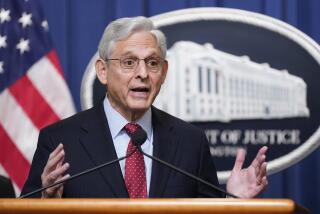Bush Considering Punitive Action : Lithuania: The Administration feels increased pressure to react to Moscow’s crackdown on the Baltic republic.
- Share via
ORLANDO, Fla. — With events in Lithuania apparently forcing its hand, the White House announced Friday that President Bush would step up consultations with allies and with Congress on whether to take punitive action against the Soviet Union for its crackdown on the independence movement in the Baltic republic.
For weeks, Bush has played for time, talking tough and then evincing understanding, in an effort to avoid taking action that could harm U.S.-Soviet relations.
But after a week in which the Kremlin steadily increased its pressure on Lithuania, decision-time seemed near for Bush--even nearer with reports Friday that the Soviets had diverted some Lithuanian food shipments and stormed a printing office in Vilnius, the Lithuanian capital.
“We are increasingly concerned by news reports today of an economic crackdown in Lithuania,” White House Press Secretary Marlin Fitzwater said as Bush was about to leave Birmingham, Ala., en route to Orlando, Fla., during a day of speech-making at political fund-raising events.
“Although our information is sketchy, we are disturbed that this signals another unfortunate step in the pressure being brought to bear in Lithuania by the Soviet Union,” Fitzwater said.
After consultations with congressional leaders early next week, the President “would be prepared to announce actions fairly soon,” Fitzwater said.
Still, for all its tenor of deadlines and lost patience, the White House statement amounted to little more than a “no comment,” one White House official said.
However, it served two purposes: It offered a demonstration of White House concern, reflected in an ever-so-slightly heightened tone in the Administration’s rhetoric, while continuing to buy time for specific action. That has been Bush’s approach throughout the week, as the Soviets moved from threats of economic action to specific measures.
“He’s playing a wait-and-see game as long as he can before he has to move,” said Richard L. Grant, an expert on Eastern Europe on the staff of the Center for Strategic and International Studies in Washington.
Fitzwater said Bush had stepped up consultations with U.S. allies on “appropriate responses the United States should take.” Bush has already spoken with West German Chancellor Helmut Kohl, by telephone Wednesday, and with French President Francois Mitterrand, who visited him in Key Largo, Fla., on Thursday.
“We continue to urge the Soviet Union to pursue a course of peaceful dialogue in the hope that this matter can be resolved in a responsible manner,” said Fitzwater, speaking after learning of Friday’s new actions by the Kremlin.
In edging up to specific actions, the Administration is courting a step that could prove unpopular.
An NBC News-Wall Street Journal survey made public Wednesday found that in a choice between maintaining friendly ties with Soviet President Mikhail S. Gorbachev and supporting the Lithuanian secessionists, 61% favored U.S.-Soviet ties, 23% favored support for Lithuania, and 16% were undecided.
“We think we need to let the American people know that this is of grave concern,” Fitzwater said.
Ever since the Lithuanian Parliament declared the Baltic republic’s independence March 11, Bush has been torn between steps intended to support the secessionists and his concern that the split would weaken Gorbachev, whose political and economic reform policies the Administration supports.
“The important thing is maintaining domestic support in the United States for what is a radical departure in American attitudes toward the Soviet Union,” said Robert E. Hunter, a director of European affairs on the National Security Council staff during the Jimmy Carter Administration. “Bush has to convince the American people that he is doing what he can without pushing Gorbachev over a line that we cannot calculate.”
The President’s options are limited--something Carter discovered a decade ago when he sought to demonstrate U.S. opposition to the Soviet invasion of Afghanistan.
Carter imposed a grain embargo, which proved unpopular throughout the farm belt in an election year, and he barred U.S. participation in the 1980 summer Olympic Games in Moscow. Neither step tempered the invasion.
Now, as U.S. relations with the Soviet Union are warming to unprecedented post-World War II levels, there is little appetite for measures that could end the thawing. And, said Grant, “the United States is not a significant enough player in the Soviet economy to make that big a difference.”
Administration officials have indicated that if the United States does take action, the measures would almost certainly involve limited economic steps--slowing down trade talks, delaying measures intended to spur U.S. investment in the Soviet Union, and holding back U.S. support for granting the Soviet Union observer status in the General Agreement on Tariffs and Trade.
So far, U.S. officials have said a summit meeting between Bush and Gorbachev, scheduled to begin in Washington in 5 1/2 weeks, is not in jeopardy.
Indeed, the poll found the American public opposes canceling the summit by 61% to 31%, even if violence is used to bring Lithuania back into the Soviet fold.
Times staff writer Norman Kempster, in Washington, contributed to this story.
More to Read
Get the L.A. Times Politics newsletter
Deeply reported insights into legislation, politics and policy from Sacramento, Washington and beyond. In your inbox twice per week.
You may occasionally receive promotional content from the Los Angeles Times.










